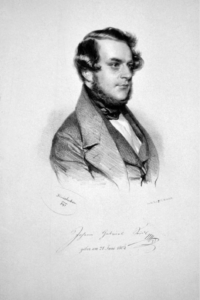Brightness at night
(Poet's title: Nachthelle)
Set by Schubert:
D 892
for tenor, TTBB quartet and piano[September 1826]
Die Nacht ist heiter und ist rein,
Im allerhellsten Glanz.
Die Häuser schaun verwundert drein,
Stehn übersilbert ganz.
In mir ist’s hell so wunderbar,
So voll und übervoll,
Und waltet drinnen frei und klar,
Ganz ohne Leid und Groll.
Ich fass in meinem Herzenshaus
Nicht all das reiche Licht,
Es will hinaus, es muss hinaus,
Der letzte Schranke bricht.
The night is serene and is pure
In the brightest possible glow:
The houses are looking in with amazement,
They are completely covered in silver.
Inside me it is so wonderfully bright,
So full and overflowing,
And everything within is free and clear,
Totally without pain or resentment.
Within the house of my heart I cannot grasp
All of that rich light:
It wants to get out, it has to get out,
The last barrier has broken.
All translations into English that appear on this website, unless otherwise stated, are by Malcolm Wren. You are free to use them on condition that you acknowledge Malcolm Wren as the translator and schubertsong.uk as the source. Unless otherwise stated, the comments and essays that appear after the texts and translations are by Malcolm Wren and are © Copyright.
☙
Themes and images in this text:
Breaking and shattering Covers and covering Emptiness and fullness Hearts Houses Light Night and the moon Silver
Sometimes darkness is a precondition for clarity. This poem relates such an experience of enlightenment on two levels, inner and outer (or literal and metaphorical).
The scenario presents someone sitting inside a dark room becoming aware of the brightness and beauty of the light outside. The houses opposite seem to be peering into the writer’s own window as they gleam in the silver moonlight. This brings about some sort of inner transformation and an overflowing sense of contentment. The poet therefore feels the need to escape from the constraints of a dark room (and a narrow mind, perhaps). Some sort of barrier breaks; there is a ‘breakthrough’. The writer can be confined no longer.
The overcoming of writer’s block is one of the most obvious candidates for the sort of experience being presented here. Perhaps a problem has been resolved or a long-delayed and difficult decision has finally been taken. The important point is that the brightness of the night (an oxymoron in the German compound noun ‘Nachthelle’) has resulted in insight. External light has produced inner clarity: insight. Now, it has to break out.
☙
Original Spelling and note on the text Nachthelle Die Nacht ist heiter und ist rein, Im allerhellsten Glanz: Die Häuser schaun verwundert drein, Stehn übersilbert ganz. In mir ist's hell so wunderbar, So voll und übervoll, Und waltet drinnen frei und klar, Ganz ohne Leid und Groll. Ich faß' in meinem Herzenshaus Nicht all das reiche Licht: Es will hinaus, es muß hinaus, Der letzte Schranke bricht.1 1 When the text was published in 1826 the last line was 'Ich halt' es länger nicht!' (I cannot hold it back any longer). It is impossible to know if Schubert made the change himself or if he was working from an earlier draft by the poet.
Confirmed by Peter Rastl with Schubert’s source, Joh. Gabr. Seidl’s Dichtungen. Zweiter Theil. Lieder der Nacht. […] Von Johann Gabriel Seidl. Wien. Druck und Verlag von J. P. Sollinger. 1826, page 35; with Lieder der Nacht. Von Johann Gabriel Seidl. Zweite, verbesserte und vermehrte Auflage. Wien, 1851. Druck und Verlag von J. P. Sollinger’s Witwe, page 42; and with Joh. Gabr. Seidl’s gesammelte Schriften. Mit einer Einleitung von Julius von der Traun. Herausgegeben von Hans Max. Erster Band. […] Wien, 1877. Wilhelm Braumüller k.k. Hof- und Universitätsbuchhändler, pages 38-39.
To see an early edition of the text, go to page 35 [43 von 190] here: http://digital.onb.ac.at/OnbViewer/viewer.faces?doc=ABO_%2BZ179729407


